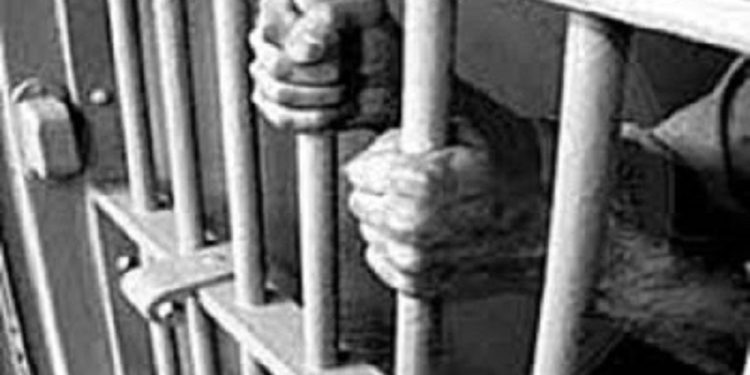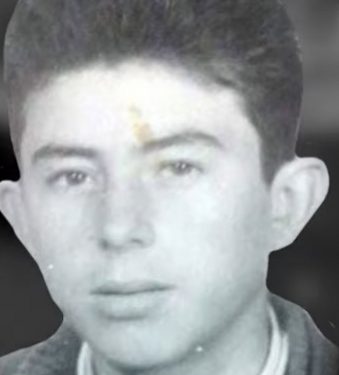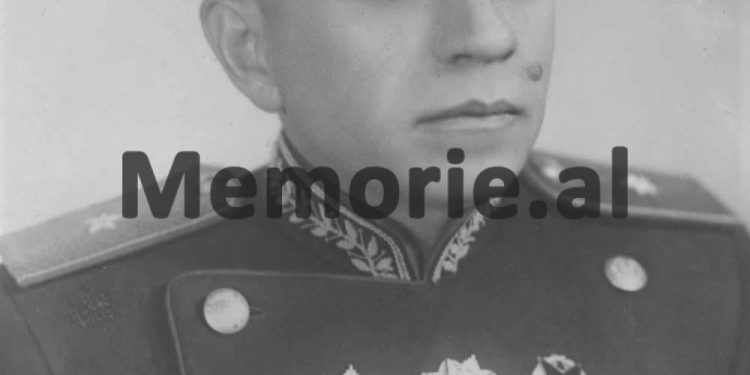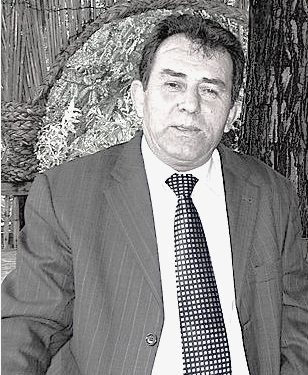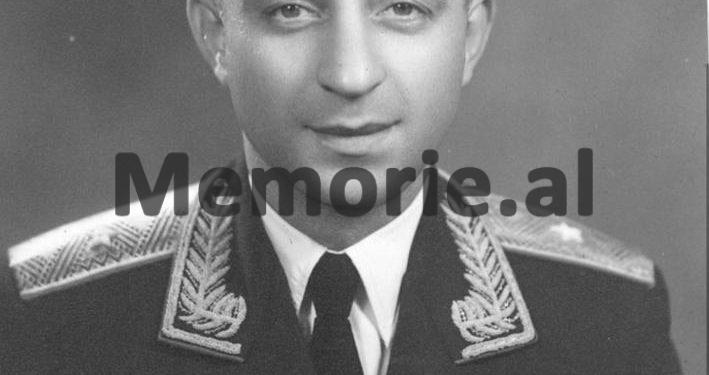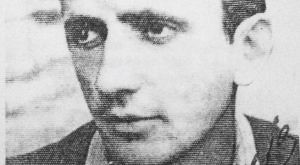By Shkëlqim Abazi
Part fifty
Memorie.al / I were born on 23.12.1951, in the black month, of the time of mourning, under the blackest communist regime. On September 23, 1968, the sadistic chief investigator, Llambi Gegeni, the ignorant investigator Shyqyri Çoku, and the cruel prosecutor, Thoma Tutulani, mutilated me at the Internal Affairs Branch in Shkodër, split my head, blinded one eye, deafened one ear, after breaking several ribs, half of my molar teeth, and the thumb of my left hand, on October 23, 1968, they took me to court, where the wretch Faik Minarolli gave me a ten-year political prison sentence. After cutting my sentence in half because I was still a minor, sixteen years old, on November 23, 1968, they took me to the Rrëps political camp, and from there, on September 23, 1970, to the Spaç camp, where on May 23, 1973, in the political prisoners’ revolt, four martyrs were sentenced to death and executed by firing squad: Pal Zefi, Skënder Daja, Hajri Pashaj, and Dervish Bejko.
On June 23, 2013, the Democratic Party lost the elections, a process that is perfectly normal in the democracy we claim to have. But on October 23, 2013, the General Director of the “Rilindas” (Renaissance) Government sent Order No. 2203, dated 23.10.2013, for; The dismissal of a police employee. So, Divine Providence was intertwined with the neo-communist “Rilindas” Providence, and precisely on the 23rd, I was replaced, no more and no less, by the former operative of the Burrel Prison Security. What could be more significant than that?! The former political prisoner is replaced by the former persecutor!
The Author
SHKËLQIM ABAZI
RREPSI
(Forced labor camp)
Memoir
The First Meeting
(The boat sunk in the swamp)
Bedri: – “I gave you the answer, from the Party and the territorial units that kept the areas under surveillance during the years of occupation.”
Ilia: – “Bedri, this convinces no one! Anyone at that time could point the finger at anyone! I believe this happened, as long as the accuser felt immune before the Party! Do you know how many people went to the dogs with these methods? Why on earth did no one come forward to demand accountability! Or were they crimes with compensation? We killed this one, so you can kill that other one, as if we were talking about horse deals”?!
Bedri: – “There may have been mistakes, and abusive cases, but generally, the people who had engaged in criminal activity, to the detriment of the people, were eliminated.”
Ilia: – “But later, when you started the trials under the screams of the mad crowds ‘enemies on the rope’? Where every week and every month, dozens of intellectuals went to the rope and the bullet, and you, sir, and your comrades, were the executioners; tell me, did all those people deserve to die”?!
Bedri: – “Maybe there was a bit of exaggeration, but at that time, war crimes had to be punished. Nuremberg had also been set up, where the Nazi hierarchs were being punished.”
Ilia: – “You said it yourself, the Nazi hierarchs were being punished! Certainly, this is the truth! But, they were punishing the perpetrators of the world’s slaughterhouse, those who had conceived, planned, and implemented it, not those who had suffered it or were implicated for the good of their people! In Nuremberg, courts with specialists were established; the most famous jurists of the democratic world were part of the judging panels. But what happened with us?
A bunch of laymen, a tinsmith, a tinker, a blacksmith, and a saddler were gathered and formed the judicial body! The sans-culottes were sent to the bullet and the rope, the cream of the Albanian nation! So, as you see, there is a big difference between the German Nuremberg and the Albanian Nuremberg. The German Nuremberg was led by craftsmen; with us, the executioners acted! Not everyone there was sentenced to death, but according to their responsibilities, while here no one was spared!
Bedri: – “Certainly, if you look at the events from today’s perspective, many things should have been done differently, but the lack of experience, plus the euphoria of victory, led to what is known.”
Ilia: – “But now, why doesn’t the course change, what is being waited for? For the unnecessary and innocent victims to be rehabilitated and apologized to”?!
Bedri: – “Ilia, I’m sorry, but who are you expecting an apology from, the son of a whore?! I assure you: you will never hear that word from his mouth, or from those similar to him! We, in Gjirokastër, call types like him Bashto! Did you get it? BASHTO, in capital letters! Which means scoundrel, ingrate, spectacle, clown, cruel-spirited, tar-hearted; assign him any negative epithet, you won’t be wrong.”
Ilia: – “It’s fine for us who didn’t know him and made a mistake, but how did you and the other Gjirokastrits accept him at the helm when you knew him as Bashto?”
Bedri: – “It is the only regret in my life. I don’t know how that BASHTO managed to deceive me! The son of a whore! Even today I ask myself: did he cast a spell on me? I don’t know”?!
This was a fragment from the debate between them, which I presented plainly, without including the emotions in parentheses. Naturally, such clashes were common in those environments, where not only I, but many others, have been witnesses to these reflections. Ilia, with his arguments, often put Bedri in a difficult position, but not only him.
A piece of debate between Ilia and General Gjin Marku
Ilia: – “Gjin, you have been disloyal! For you, as a highlander, it was unacceptable to break your given word.”
Gjin: – “I don’t know which case you are referring to? Because I have had to make many agreements and make many decisions, in extremely difficult circumstances and under special, specific conditions.”
Ilia: – “No, it’s not one case, but I will mention them one by one.
First: you betrayed the deputy of Berat, Hysni Toska, you handed him over to the Germans. You deceived them, claiming that you had surrounded the criminal Isa Toska and, in cooperation with their squad, who arrived urgently from Ura-Vajgurore, you eliminated the deputy. The whole district of Berat and Mallakastra knew that their deputy had sentenced the criminal Isa Toska to death for ordinary crimes. As a result, this criminal burned his palaces in Luar, so the deputy was living on charity, among friends. I don’t believe you didn’t know this? Second: you executed the seventeen-year-old partisan Skënder Toska, just because he was Hysniu’s son! You spread the word that he had deserted, when this was not true.”
Gjin: – “First: you know, we invited Hysni Toska to cooperate, but he refused and went with the ‘Balli’, meaning he became our opponent, and in wartime tactics, alliances against the same enemy are recognized; I exploited this tactic. Second: I was not at all in agreement with the elimination of his son, but it was too late, they had executed him when I was notified.”
Ilia: – “Nevertheless, don’t pretend you didn’t know, because without your order, even the birds did not fly in the Berat district, let alone an execution take place!”
Gjin: – “Don’t forget, dear Ilia, we were at war; it wasn’t so easy to keep the situation under control. Waters flowed quickly, and events rolled one after the other; today someone was killed, tomorrow ten others took revenge. When the problem reached me, it had taken on such dimensions that there was no possibility of repair. However, I tried to give the events the right direction.”
Ilia: – “Berat has been a buzzing hive, where swarms of worker bees and poisonous wasps stung each other. You were at the epicenter, like the queen bee gathering her daughters. Instead of sowing love, you nurtured division, at least the later facts proved this. Some young boys, with ideals as pure as a teardrop, when they saw that you plunged the country into bloodshed, called for an end to the fratricide, distanced themselves, and created the group of young democrats. But how did you act? Certainly, like bandits!
You didn’t like this platform, because it distanced you from power, so you started the witch hunt, and the result: two twenty-year-olds executed and two others with long prison sentences. In this game, you played the hypocrite, you were silent. Those who sacrificed everything for you and your comrades were punished by the supposed people’s courts, in fact, by the millers and charcoal burners.
Even when dozens of families of honest merchants, who fed and sheltered you for years, were terrorized at the Internal Branches, hung upside down in barrels of filthy water, to hand over the gold earned with work, you were still deaf and blind. Who better than you knew the sacrifices of those people who shared their bite of food with you? Again you were silent; did you like the shoulder pads”?!
Gjin: – “We lived in difficult times, dear friend! In war, without discipline, you can’t advance even a single day. As for the group you mentioned, they were indeed talented young people, but the education in bourgeois families led them to opportunism. There’s no need to elaborate, I’ll briefly tell you who they were: Namik Mehqemeja, an offspring of a bourgeois intellectual family, who took the war as poetry! Resul Dollani (Tozhari), a merchant’s son. The father with the ‘Balli’, the son with the Party, meaning one hand in the revani, one in the bakllava. When he saw that he didn’t succeed here, he jumped there!
Fatbardh Guri, a peasant who thought he had become civilized, and thought that the sea had turned into yogurt and the mountain into pilaf, and ‘let’s go, grab the spoon’! Finally: another peasant similar to the first, Hair Seiti (Karkanjozi). However, we who led the war could not fall prey to petty-bourgeois emotions; so they chose their own end. As for the merchants, they did keep us with bread and clothes, but they also swelled up like leeches with the profits of the war. Besides, where would we find food for the people? Why, would they give it to us with respects?! Whether we liked it or not, the violence was justified, although with some it was slightly exaggerated.”
Ilia: – “Oh, Gjin, I pity you! I note with regret that even today, you have remained the same fanatic communist. You fail to understand reality. How do you not see how many crimes have been committed and are being committed, every day, to prolong the life of this uncivilized regime?! Look only at your region, Mirdita: hundreds of escapees, hundreds of killed, hundreds of imprisoned, thousands of politically interned. This is the terrible panorama; this is what all of Albania has been reduced to!”
Gjin: – “Indeed, there is excessive class struggle; one of the regions that paid and is experiencing it most harshly is my Mirdita. But remember, my friend, these people grew up under the shadow of the bell tower, outside the influence of the state, despite all my efforts to somewhat soften the situation; the population of these parts listens more to the parish priest than to the Party secretary. Thus, the counter-response would also be harsh, and what is known happened. Well, there is no wedding without meat and no war without blood.”
Ilia: – “You are responsible, because you propagated the communist paradise, you deceived your people!”
Gjin: – “When we talk about communism, we must make a distinction between theoretical and practical communism. The misfortune with us is the wrong application, where petty, unprincipled individuals penetrated the high ranks of power, while the idealists felt bad and powerless in confronting them. But this situation will not last forever; real communism will triumph very soon.
Despite the current difficulties, communism is the future of peoples everywhere in the world. This stagnation today will soon be overcome, and the Soviet example will spread everywhere. Even these transitional hardships have been foreseen in the works of the great classics; Marx, Engels, and Lenin anticipated these situations.”
Ilia: – “There is no worse blind man than the one who does not want to see! Ultimately, you have remained the same, oh dear boy! Even after they destroyed your life and family. Woe to you, poor man!”
This was more or less the topic of the debate between them, at the moment I was present. But such conversations were frequent, and the positions had turned into insurmountable trenches. General Gjin paid a very high price for his faith in his wrong ideal. He died in the cells of Burrel, his wife in an asylum, his son, Aleksandër, ended up with me in Spaç, and his daughter grew old in the swamps, in internment. He remained stoic to his perverse ideal.
A passage of debates between Ilia and General Halim Xhelo!
Ilia: – “Halim, how do you explain that Dukat did not surrender even after Berlin fell?!”
Halim: – “Eh, what is there to explain here, you poor thing! Dukat as Dukat, with its head held high on the Çika mountain and its feet down in Pasha-Liman, catches the signals a little slowly. Besides, the people of Dukat have always been interesting; they move a little slowly at first, like a buffalo, but in the charge march, there is nothing to hold them back!”
Ilia: – “All right, Halim, we understood that, but why did all the people of Dukat join the ‘Balli’ and ignore the Communist Party?!”
Halim: – “Why, what did Dukat care what the ‘Balli’ was, what the Party was! The man of Dukat puts his qylaf on his head, throws his brruca over one arm, the rifle over the other, tightens the sash around his waist, and rushes after the fortune, where there is fire and where smoke comes out, where the drum goes boom! Thus, they enter the guestrooms where they converse and sing. These were the archaic traditions; this is what the ‘Balli’ represented. While the new, for the traditional man of Dukat, was somewhat unknown, but not that there were no communists; in every house where there were two Ballists, there would be one communist.
Ilia: – “I have heard about the quarrel between you and your father, what is the truth?”
Halim: – “Talking about my family problems is not easy for me. The people of Dukat are honest, righteous, and faithful people, but since we grew up with goats and sheep in the sheepfolds, we have inherited a somewhat wild character; the father’s word is law in the family, woe to him who goes against it! My father was an old fighter of the independence squads, alongside the Vloras.
Later, in the twenties, he took up the rifle against the first Italy, defended the village and the coast, up to Vlorë, but with a weapon in hand, he also opposed the second Italy. He sent us children to schools; he wanted to make us knowledgeable and worthy of the family and the country. Thus, when Italy came, I had come into contact with communist ideas. Initially, my father was not worried, because, after all, we didn’t have any great activity either.
‘The young man is like the north wind,’ he would justify to his friends, ‘he will understand and come with us!’ But our paths diverged. I got involved with the Vlorë squad; later, battalions and brigades were created, and the war took on greater dimensions. Thus, we found ourselves in opposing camps.
Often, when I had to move in my village, even in my own house, we did not meet each other; to tell the truth, I avoided meeting him. The moment came when the rift between the nationalists and the communists took on alarming dimensions; many graves were opened between us, regardless of who was the cause of the fratricide.
Even though I avoided confronting my father and stayed as far away from the village as possible, the situation still required me to propagate the new ideas among the youth, to increase the ranks of the partisan forces, because the village youth preferred to follow the elders. However, as I mentioned above, the elders were with the ‘Balli’, so whether I wanted to or not, I went to Dukat. We held a meeting in the middle of the village, where I had to harshly curse the ‘Balli’s’ policy and consequently Xhelo Koçiu, my father.
I don’t remember who provoked me: what would I do with my father if I caught him alive? To make the idea I represented more convincing and to influence others, I must have said: ‘If I catch my father prisoner, I will hang him in the middle of the village!’, or something similar. Honestly, I am unable to affirm or deny it; I was under the effect of heroic euphoria.
When we left the village, someone had transmitted these words to my father, and he had told them that if he caught me, he would beat me in the middle of the village until I was shamed before the world. I’m not sure if he said it or not, but that’s how they brought it to me. Fortunately, we left the area and did not meet him again. In the end, we won the war, and he fled abroad, where he also died. If I had caught him, what would I have done? I don’t know, honestly! Maybe he would have ended up like his comrades, executed.”
Ilia: – “See how far communist blindness takes you, to kill even the one who brought you into this world for the sake of supposed principles! To be honest, I also had these thoughts initially, but when I saw the boundaries of honesty being crossed, and the eliminations extended to innocent people, to those who fed us, I distanced myself and asked my comrades to do the same. The one-sided fratricide was our fatal mistake, as national-liberators, while the opposing camp, on the contrary, held its hand. I don’t know about you in Vlorë, but in Berat, I saw it myself.”
Halim: – “Here and there, the sea is equally salty, but we also had the right on our side; they joined the occupiers. Besides, we were fighting for power; power was not taken by stroking the ‘Balli’s’ head! War has these things; we with rifles, them with rifles, two hands for one head are what we had. We were more agile, we attracted the attention and sympathy of the Allies, and we also brought the people with us, and in the end, we won! The winner is not judged; the rituals must be done for him. Even the loser must respect him.”
Ilia: – “Winners are magnanimous, dear Halim; when the war ends, there is forgiveness! Forgiveness is a characteristic of generous winners! Even in the arena, not all the defeated were killed; the spectators raised their thumbs up after the duel ended. But what did we do? We remained with our thumbs down! We even punished the neutrals because they didn’t join us! An Albanian doesn’t act like this with an Albanian!
Tell me, who did we leave unpunished? We even sent our fellow fighters to the grave! Yes, in the northern areas, reprisals were carried out; we set fire to the houses indiscriminately, we killed and mutilated, guilty or innocent. These are acts of damnation that will follow us for generations!”
Halim: – “It was the only way to pacify those regions. There is no mercy with the enemy; either take a head or leave a head! Whoever forgives, loses.”
Ilia: – “No, honored sir, we didn’t have the enemy in front of us, but Albanians! A tragedy! But what do you expect from the brainwashed, from those who were ready to kill even their father! With this, the conversation ended that day.” Stubborn Halim did not back down, even though he was wrong.
A passage of debates between Ilia and Maqo Çomo!
Ilia: – “Maqo, I am glad when I see that you have reflected on the mistakes of the past. A person can make a mistake, but when they realize it, they should not lack the ability to repair it. When you have the possibility to change it, you change it; when you can, at least you condemn it.”
Maqo: – “Undoubtedly, we have made mistakes on our path, and they really need to be repaired; I agree with you. But by whom, then?! By us who are in prisons today and no longer have this chance? However, for reflection, we have all the time in the world! As for myself, I understood the mistakes in time, but I didn’t have the courage to confront them. Then, the belief that they could be corrected along the way made me mute. But now we have no right to be silent; silence makes us twice guilty!”
Ilia: – “Like all communists, you also had to end up here, without speaking. As long as you were up there, you aimed for the peaks. After marrying Liri, you started climbing the steps of power, two and three at a time. I don’t know, did you deserve the rapid career for your abilities or was it given to you as a dowry for the marriage bond?”
Maqo: – “Eh, what do you expect me to tell you? It might have been both together, or neither. It was the moment when a misfortune, known to everyone, had happened to my future wife. Nako Spiru, her husband and also my friend, committed suicide. She herself went into a difficult depressive state; she needed a shoulder to lean on; I offered it to her. We married more or less in an arranged marriage, almost by order from above. The Politburo called me, they proposed the connection, I accepted. This was approximately what happened, naturally with my desire as well.
After the marriage, with the exception of the elbowing in the high political circles, I had a happy and quiet life; my wife was a loyal woman and an ideal mother for my children. This period coincides with my rise in office; the career was fast and unexpected; I was not prepared, neither spiritually nor professionally, for the lightning-fast catapulting. At first, I was timid, but with the support of the leading comrades of the Party and colleagues, I overcame the moments of uncertainty and normally entered the role of minister.” Memorie.al




